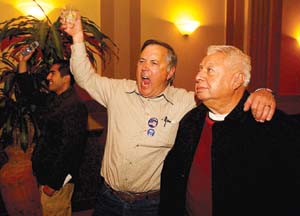
Measure G was overwhelmingly defeated in the election
Tuesday
– ending more than a year of building tension and angst-filled
rhetoric in San Benito County.
Measure G was overwhelmingly defeated in the election Tuesday – ending more than a year of building tension and angst-filled rhetoric in San Benito County.
The measure was voted down 7,930 to 3,581 – a 69-percent to 31-percent margin. After the first group of precincts’ results came through, an anxious mood among initiative opponents turned to pure elation.
“This is a good thing tonight,” said San Juan Bautista rancher Joe Morris, at The Vault restaurant, where the No on Measure G committee held a party Tuesday night. “It’s going to put people in a much more relaxed mood, where minds can be open and looking toward what we really want.”
Measure G, initially called the Growth Control Initiative, was a plan drafted by a group of residents to preserve agricultural land in unincorporated San Benito County. Most controversially, it changed zoning of certain ag properties to highly restrict future development.
The authors of the initiative, calling themselves the Citizens for Responsible Growth, were surprised by the wide margin of defeat, according to Janet Brians, their designated spokesperson.
Though she said they don’t regret the effort.
“We certainly have raised the level of concern in the county, hopefully, about saving our prime farmland,” Brians said.
Brians believes the level of opposition to Measure G escalated in the past few weeks before the election. Why that happened, she said, “I don’t think I really have an especially good answer.”
Maybe it had something to do with the profusion of signs around town – more against the measure than for it – cropping up in recent weeks. Both campaigns hit high gear – with mailers, advertisements, phone calls to residents and rallies.
Both campaigns raised six-figure totals for their campaigns. The No campaign received contributions of more than $310,000. And the Yes campaign brought in about $115,000, about 80 percent of which came from out-of-county donors.
The No on Measure G committee remained confident, according to Annette Giacomazzi, chairperson of the campaign. They were concerned, mostly, when obstacles arose – such as a failed effort to enact the initiative through the courts.
“We never want outsiders to come back to San Benito County,” said Giacomazzi, from the Vault, as revelers in the background cheered to flashed election results on a TV screen. “We are the only ones that know how to do it well.”
San Juan resident Rebecca McGovern – the plaintiff in the court battle backed by environmental lawyers from Earthjustice – called the voters, “so very, very stupid.”
She said people will regret the vote when “ticky tacky homes” start sprouting along hillsides.
“They heard an awful lot of lies,” said McGovern, waiting for the final results at the county courthouse. “The real issue was never allowed to be discussed rationally.”
Also joining McGovern’s court proceedings in late 2003 was an anonymous group called Los Valientes, led by Salinas lawyer Michael Pekin. They alleged county supervisors illegally contributed to the drafting of the initiative.
“Measure G is history – cooked,” said Pekin on Tuesday night. “I’m speechless.”
The No campaign recently received a boost from many organizations and leaders announcing their oppositions to it. Among them were: the Hollister Downtown Association, the county Chamber of Commerce, the San Benito Association of Realtors and state Sen. Jeff Denham (R-Salinas).
Many business community leaders believe the measure would have further damaged an already sluggish local economy.
“We have hope – finally,” said Ignacio Velazquez, owner of The Vault, after the results were final.
“They didn’t understand the seriousness of the anti-business components of that measure,” said vocal opponent Tony Ruiz. “And the voters did.”
Voters almost didn’t get that opportunity to have a say.
After the measure’s authors gathered more than 6,000 signatures in early 2003, the Board of Supervisors approved it outright 4–1; Reb Monaco was the only dissenting vote.
But then opponents mounted and gathered more than 5,000 signatures of their own, compelling the Board in July to send the initiative to the ballot.
“I just wish,” said Brians, the Yes committee chairperson, “rather than in a negative fashion, people would have been able to spend this much energy in a positive fashion.”
Morris, a cattle rancher, spearheaded several “consensus building workshops” from July through the end of 2003. He hopes county residents can meet “in the very near future” to continue discussing growth-related land issues.
“The ag community does not want to go through this again,” Morris said.
– In other local initiative votes, two San Juan Bautista measures passed, both special taxes.
Measure H, a 2-percent motel/hotel tax increase to fund bathroom and parking improvements in the city, passed with 70-percent approval there from voters.
Measure I, a sales tax increase of .75-percent to fund enhanced public safety protection, passed with 63-percent voter approval.









